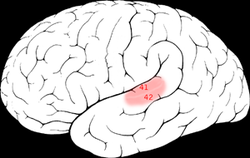Psychology

Modern music psychology aims to explain and understand musical behavior and experience. Research in this field and its subfields are primarily empirical; their knowledge tends to advance on the basis of interpretations of data collected by systematic observation of and interaction with human participants. In addition to its focus on fundamental perceptions and cognitive processes, music psychology is a field of research with practical relevance for many areas, including music performance, composition, education, criticism, and therapy, as well as investigations of human aptitude, skill, intelligence, creativity, and social behavior.
Cognitive neuroscience of music
Cognitive neuroscience of music is the scientific study of brain-based mechanisms involved in the cognitive processes underlying music. These behaviours include music listening, performing, composing, reading, writing, and ancillary activities. It also is increasingly concerned with the brain basis for musical aesthetics and musical emotion. The field is distinguished by its reliance on direct observations of the brain, using such techniques as functional magnetic resonance imaging (fMRI), transcranial magnetic stimulation (TMS), magnetoencephalography (MEG), electroencephalography (EEG), and positron emission tomography (PET).
Cognitive musicology
Cognitive musicology is a branch of cognitive science concerned with computationally modeling musical knowledge with the goal of understanding both music and cognition. The use of computer models provides an exacting, interactive medium in which to formulate and test theories and has roots in artificial intelligence and cognitive science.
This interdisciplinary field investigates topics such as the parallels between language and music in the brain. Biologically inspired models of computation are often included in research, such as neural networks and evolutionary programs. This field seeks to model how musical knowledge is represented, stored, perceived, performed, and generated. By using a well-structured computer environment, the systematic structures of these cognitive phenomena can be investigated.
Psychoacoustics
Psychoacoustics is the scientific study of sound perception. More specifically, it is the branch of science studying the psychological and physiological responses associated with sound (including speech and music). It can be further categorized as a branch of psychophysics.
Evolutionary musicology
Evolutionary musicology concerns the "origins of music, the question of animal song, selection pressures underlying music evolution", and "music evolution and human evolution". It seeks to understand music perception and activity in the context of evolutionary theory. Charles Darwin speculated that music may have held an adaptive advantage and functioned as a protolanguage, a view which has spawned several competing theories of music evolution. An alternate view sees music as a by-product of linguistic evolution; a type of "auditory cheesecake" that pleases the senses without providing any adaptive function. This view has been directly countered by numerous music researchers.
Culture in music cognition
An individual's culture or ethnicity plays a role in their music cognition, including their preferences, emotional reaction, and musical memory. Musical preferences are biased toward culturally familiar musical traditions beginning in infancy, and adults' classification of the emotion of a musical piece depends on both culturally specific and universal structural features. Additionally, individuals' musical memory abilities are greater for culturally familiar music than for culturally unfamiliar music.
Comments
Post a Comment